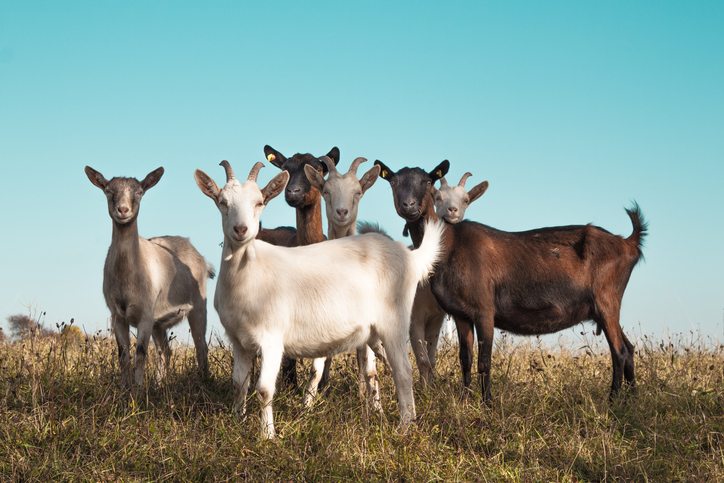
Goat nutrition requirements directly correlate with the production rates and quality of goat meat, milk, and fibre. Because they are so hardy and productive, goats are one of the most popular types of livestock among farmers, breeders, and producers.
Essential Ingredients for Proper Goat Nutrition
Nutrients are classified into six different categories: (1) protein, (2) carbohydrates, (3) fats, (4) vitamins, (5) minerals, and (6) water. Proper goat nutrition involves providing a combination of each of these nutrients to the animals in one form or another. Most breeds of goats must regularly consume feed which provides the following eight elements:
- Calcium
- Sodium
- Sulfur
- Magnesium
- Vitamin A
- Vitamin D
- Vitamin E
- Vitamin K
Like all other types of livestock, goats need to consume enough nutrients to support energy levels that dictate healthy body functions. Energy is typically acquired through the consumption of carbohydrates and fats. This can be a problem for livestock producers and farmers because an absence of energy-producing food sources leads to weight loss, with the potential for disease and even death. An overabundance of energy consumption will result in unhealthy weight gain. Optimal goat nutrition requires carefully monitor the amount of fat your herd is consuming.
A typical goat will consume 1 to 3 gallons of water throughout the course of one day, but will drink more when they are producing milk.
Feed Nutrients
Unlike cows and horses, goats are “browser animals”. Their ability to eat everything in sight is a widespread misconception, but their ability to eat a large variety of different vegetation is not exaggerated.
Goats derive the majority of nutrition from what they eat in the pasture, as well as through supplementary hay. Although goats will consume any type of hay they’re provided, it’s best to give them a legume hay, such as alfalfa. Why? Because alfalfa contains many of the most essential ingredients needed to meet the requirements for goat nutrition.
Some operations achieve proper goat nutrition through the use of chaffhaye. This alternative feed is produced using a mixture of young alfalfa grass, molasses, and a specialized bacteria culture. Chaffhaye provides adequate levels of goat nutrition at costs significantly lower than those of traditional hay.
Goat Nutrition Supplements
There are numerous animal health risks inherent in livestock operations. Goat farmers and producers must be prepared to protect the health of their herds with the use of feed supplementation when necessary.
5 Common Goat Nutrition Supplements:
- Sodium bicarbonate (typically administered in the form of baking soda)
- Digestive probiotics
- Copper
- Thiamine
- Iron
Goats don’t require their nutritional supplements to be mixed into their feed, unlike many other types of livestock. When provided, goats tend to consume the optimal amounts of minerals required to maintain health, with little to no coaxing. Most farms supply bins of loose minerals for their goat herds so they can consume nutrients at their own pace.
Consider a Goat Nutrition Plan
Placing your herd of goats on a regulated nutrition plan will give you greater control over the value and well-being of your livestock. In addition, a nutrition plan is a great way to address potential problems, such as nutrient deficiencies, early on in the life of the goat. This allows you to counter the effects of negative factors damaging the value of your herd.
Your goat nutrition plan should vary depending on the ultimate purpose of the animals being raised. Nutrition intake for dairy goats will depend on their lactation process. Their voluntary intake of dry matter increases immediately after parturition and reaches a maximum between 6 to 10 weeks of lactation before decreasing.
Goats intended for meat production require larger amounts of protein intake due to higher energy requirements that meet their body’s demand to bulk up. Feedlot-style operations will tend to produce larger animals, but some farms prefer to keep their animals fed with a free-range system. It should be noted that goats do not fatten like other meat-production livestock, including sheep and cattle. A given animal’s weight gain or loss cannot be a definitive measure of the efficacy of your goat nutrition program.


Thanks, it’s very informative
I spent a lot of time to locate something like this
Thanks to the terrific guide